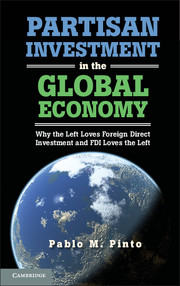 Partisan Investment in the Global Economy
Partisan Investment in the Global Economy Published online by Cambridge University Press: 05 March 2013
Introduction
The statistical evidence presented in Chapter 4, albeit tentative, suggests that the predictions from the partisan theory of FDI are plausible: when prolabor/left-leaning governments are in power, FDI inflows increase more often than not. In the longitudinal analysis presented in the previous chapter, I discuss the evolution of investment regimes and FDI performance in Argentina in the post-war era. The evidence from the Argentine case provides additional support to the partisan hypothesis by exploring changing patters of the political influence of labor and business: pro-labor and pro-capital coalitions that have alternated in power since the 1930s have treated foreign capital differently. In the Argentine case, I focus on the varying influence of organized labor, which results from institutional and other political conditions, including movements to and from democratic rule as well as partisan cycles. From Juan Perón, through the different military regimes, Radical and Desarrollista governments, to Carlos Menem and Néstor Kirchner, we observe that incumbents received varying degrees of support from workers, industrialists, and agricultural producers. Further, these governments assumed very different pro- or anti-labor stances, which in turn seem to reflect the preferences of their core supporters. As discussed in the previous chapter, changes in labor influence or in the pro-labor or pro-business orientation of the ruling coalition seem to have had an effect on the type of investment regimes adopted and on the degree of openness to FDI.
To save this book to your Kindle, first ensure [email protected] is added to your Approved Personal Document E-mail List under your Personal Document Settings on the Manage Your Content and Devices page of your Amazon account. Then enter the ‘name’ part of your Kindle email address below. Find out more about saving to your Kindle.
Note you can select to save to either the @free.kindle.com or @kindle.com variations. ‘@free.kindle.com’ emails are free but can only be saved to your device when it is connected to wi-fi. ‘@kindle.com’ emails can be delivered even when you are not connected to wi-fi, but note that service fees apply.
Find out more about the Kindle Personal Document Service.
To save content items to your account, please confirm that you agree to abide by our usage policies. If this is the first time you use this feature, you will be asked to authorise Cambridge Core to connect with your account. Find out more about saving content to Dropbox.
To save content items to your account, please confirm that you agree to abide by our usage policies. If this is the first time you use this feature, you will be asked to authorise Cambridge Core to connect with your account. Find out more about saving content to Google Drive.